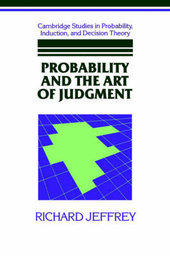
|
Probability and the Art of Judgment
Hardback
Main Details
Description
Richard Jeffrey is beyond dispute one of the most distinguished and influential philosophers working in the field of decision theory and the theory of knowledge. His work is distinctive in showing the interplay of epistemological concerns with probability and utility theory. Not only has he made use of standard probabilistic and decision theoretic tools to clarify concepts of evidential support and informed choice, he has also proposed significant modifications of the standard Bayesian position in order that it provide a better fit with actual human experience. Probability logic is viewed not as a source of judgment but as a framework for explaining the implications of probabilistic judgments and their mutual compatability This collection of essays spans a period of some 35 years and includes what have become some of the classic works in the literature. There is also one completely new piece, while in many instances Jeffrey includes afterthoughts on the older essays.
Reviews"Probability and the Art of Judgment is a valuable addition to the literature of decision theory for its broad presentation of Jeffrey's thought and for the stimulation and challenge it provides. Graduate students and researchers who study preference, subjective probability, or decision theory from either a descriptive or normative orientation can find it a rich source of ideas." Journal of Mathematical Psychology
|